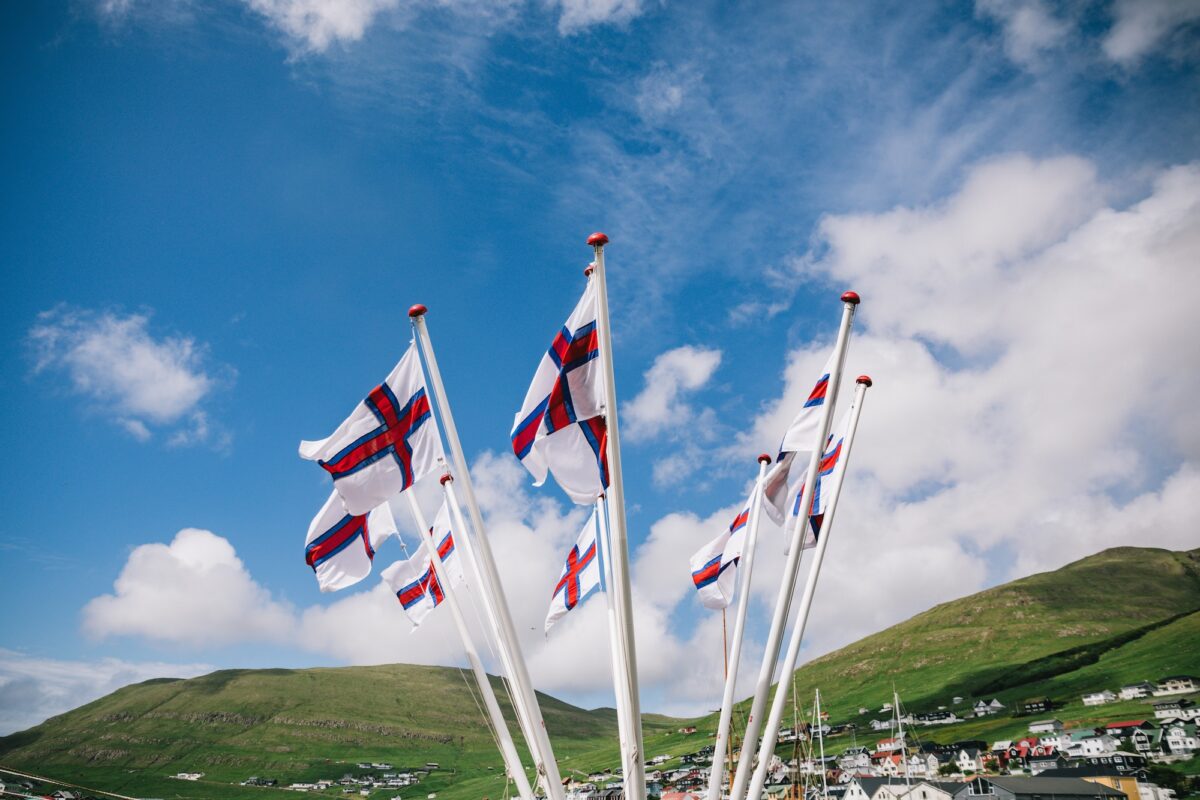It’s been *quite* a while since I’ve visited a verrrry Instagrammy spot or a new country. Hello Faroe Islands! We called in here on the North Atlantic Saga with Adventure Canada, spending nearly a week in the Faroes; every single day was extraordinary.
I don’t think I’m far off of the mark when I say that the Faroe Islands weren’t on many people’s radars until Instagram blew it up a few years ago. Staggering green sea cliffs, wild landscapes, cute sheep, and puffins made for easy storytelling in images and videos. It takes real effort to capture ugly photos here. It was the new Iceland.
Nested between Scotland, Iceland, and Norway, the Faroe Islands are actually self-governing under Denmark. Comprised of 18 main islands mostly lorded over by birds and sheep, for nearly a millennia the Faroes have been very isolated. With a population of just over 50,000, while small, the Faoes are definitely punching above their weight. This place is incredible.
With more than 70% of the land sitting 200 meters above sea level, the Faroes are full of stunning sea cliffs, home to many birds such as puffins, guillemots, skuas (the only Faroese word in the English language), and the oystercatcher, which happens to be the national bird. You’re pretty much guaranteed epic views no matter where you go.
Even after spending some time there, I can safely say that the Faroes remain an enigma. It’s a complex, interesting place full of nuances that are hard to understand as a casual visitor. Maybe this bit of mystery makes it more compelling. Forever a curious person, I was very excited to visit the Faroe Islands with Adventure Canada last June.



I spent the northern hemisphere summer at sea working with Adventure Canada in northern Europe, the Arctic and Atlantic Canada. After exploring Scotland for over two weeks, we set sail for the Faroes. Their trip, Scotland, The Faroe Islands, & Iceland: North Atlantic Saga, is one of the most popular, occurring every other year.
There is something pretty special about following in the wake of the Vikings across the North Atlantic by sea. Or perhaps the Irish monks – there is now evidence to suggest the Faroes were settled hundreds of years before the Norse began to set sail in earnest. The sea dominates every aspect of life on the Faroe Islands. To explore it by boat feels symbolic.
The ports are ancient; the roads are modern. In fact, the roads were better here than in New Zealand. I was surprised to learn that the Faroes have one of the highest GDP per capita in Europe, one of the big reasons why I personally disagree with their complicated stance on whaling.
That being said, we don’t visit governments or judge entire countries based on one thing (generally speaking). I visit people. Humans. Places. And I loved the Faroes. There’s nowhere quite like it. Here are some of my favorite photos from my visit to the Faroe Islands – Enjoy!



Vágur
Something you can’t help but notice upon arriving in the Faroes is the colorful houses. It seems that every town and village has distinct and brightly painted homes, different from their neighbors as if they’re outdoing each other. In conjunction with the neon green landscape and blue seas, it’s hard to imagine a more colorful country.
Our first stop with Adventure Canada in the Faroe Islands was Vágur, on the island of Suðuroy. A quiet and peaceful place; it’s a bit off the grid, and you won’t run into many tourists here. It was also my first introduction to the bright and colorful houses. And to the adorable sheep, you see everywhere.
Sheep and the Faroe Islands go hand in hand. Here, sheep outnumber humans (which isn’t hard since only 54,000 people call the Faroes home), and you’ll see them everywhere. They’ve been here since the 9th century, and in fact, the Faroese name of the Faroes Island – Føroyar – comes from the old Norse word – Færeyjar – which literally means Sheep Islands.
The Vikings didn’t get it wrong. Tough, hardy, and pretty cute sheep pervade life here, and they know how to pose, too.



Tórshavn
Tórshavn, the capital of the Faroe Islands, is small and compact and has everything you’d like to see in a city while traveling. Home to a third of the population, in many ways it feels representative of Faroese culture.
Tradition mingles with modernity here. You can walk down winding alleys between turf roof houses with dried fish swinging in the wind. Around the corner, you’ll find stunning art galleries, charming cafes, and hip breweries. Historic wooden boats, colorful and bright, almost dominate the harbor. Classic woolen Faroese sweaters are not only abundant but obligatory. Tórshavn stands on its own as a place worth exploring.
The turf roof houses in the Faroe Islands are iconic—you see them everywhere, including right in the middle of Tórshavn, the capital. Providing insulation as well as maintaining tradition, at 62° North, with the wind and the rain, it makes sense. They do need mowing and maintenance. Some of the older houses are built down into the ground, making access easy for hungry sheep.






Gjógv
It seems every village in the Faroes is perfectly picturesque, and Gjógv is no exception. To visit the Faroe Islands is to experience epic landscapes.
Gjógv gets its name from the gorge that cuts into the land, forming a natural harbor. Climbing up the opposite side of the gorge puts its beauty into perspective, especially as puffins fly in and out of their burrows along the cliffs. This was where I got my first up close and personal encounter with these adorable birds. There so much smaller than you think they are. And they look so awkward when they fly with their legs sticking out in a floppy way.
Several of the villages around the Faroe Islands are equally dramatic. Beautiful in all weather, any day, you can see why there are so many legends and myths that have emerged from these places.




Gásadalur
When coming to visit the Faroe Islands, I think I was most excited to see Gásadalur, home to the iconic Múlafossur waterfall. This incredible waterfall tumbles down into the sea, surrounded by cute puffins (!!!) and steep sea cliffs.
Gásadalur (Goose Valley) was a very remote place for a long time. Until 2004, before the construction of a tunnel, you had to hike over a mountain from nearby Bøur, including the postman who had to come over three times a week. Either it was the best job or the worst job.
Gásadalur is a tiny village nestled between two large mountains along the stunning Faroese coastline. Until about twenty years ago, when they finally built a tunnel, you had to climb over the mountains to arrive here. No one envied the postman, especially when he carried over a washing machine on his back!
While the village has gotten quiet, the hills are busy as people flock to see the famous Múlafossur waterfall, which tumbles sixty meters down into the sea. With puffins flocking to the cliffs, it seems plucked from a fairytale. It’s certainly earned its fame.



Tindhólmur
The last day in the Faroes we spent at Tindhólmur, one of the craziest islands I’ve ever seen! A seemingly perfect right triangle, one side of the uninhabited islet is a sheer vertical cliff face rising straight up hundreds of meters from the sea. Covered in neon green grass, sheep of every color, and a shit-ton of seabirds, including ALL of the puffins, it doesn’t look real, as if someone sliced in half a pyramid and removed one side.
The legend of Tindhólmur is equally wild. It’s thought there once was a man named Rasmus who was banished here with his wife and baby to farm alone. Then, one day, a huge eagle came and stole the baby, flying all the way to the very top of the highest peak, Ørnatindur (Peak of the Eagle). With the Faroese viking roots, it’s no surprise this tale does not end well. The mother climbed to the top of the island only to find that the eagle already pecked out the eyes of the baby (sorry, guys!) who was dead. They left Tindhólmur, and no one has lived there since.
While I didn’t see any eagles here, the bird life and crazy views blew me away. Sunny and hot, it was an amazing spot to wrap up an adventure in the Faroe Islands.
Do you want to visit the Faroe Islands? Is it on your bucketlist? Share!



Many thanks to Adventure Canada for hosting me in Scotland – like always, I’m keeping it real – all opinions are my own like you could expect less from me!
The post 25 photos to inspire you to visit the Faroe Islands appeared first on Young Adventuress.

